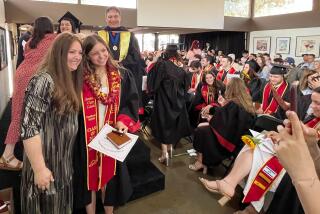CAMPUS CORRESPONDENCE : A Whitesâ Tradition Helps Blacks Gain New Power
CHAPEL HILL, N.C. â The selection of a college homecoming queen, deeply rooted in the Southern white debutante tradition, has become the Southâs latest battleground of racial symbolism.
The homecoming-queen role itself is strictly ceremonial, but black students at the University of North Carolina have used it to assert their leverage and unity. In doing so, they have won some significant campus victories.
UNC, which is 90% white, has elected a black homecoming queen every year since 1988 due to bloc voting by its black students. The campus reaction has ranged from alumni grumbling that black homecoming queens âdonât really represent the schoolâ to vandalism--in 1991, the homecoming queenâs car tires were slashed.
Year after year, the athletic association, which oversees the queenâs selection, has tried to change the rules to thwart the Black Student Movementâs bloc-voting tactics. This year, it greatly complicated the application and interview process, which the association administers. Currently, student votes count for two-thirds of a finalistâs score, the application and interview the remaining one-third. Still, a black was crowned homecoming queen.
The underlying assumption by unhappy whites is that something must be wrong with the homecoming tradition if a
majority-white school consistently elects black homecoming queens. But the string of black homecoming queens has bestowed a positive purpose on a ceremonial and symbolic post by getting black students, who must feel overwhelmingly outnumbered, more involved in campus life.
Most students donât care who is chosen to ârepresentâ the university at the homecoming game. The queen doesnât do anything, nor does she have important duties or responsibilities. But the sense of power and strength among black students generated by the homecoming-queen campaign has led to far greater achievements: a free-standing black cultural center on campus, the first black student-body president, elected last year, and a black speaker of Student Congress.
Whenever black students begin to take power or become more visible in positions of authority, someone is going to complain. Even mainstream students have suggested that the homecoming-queen ritual be abandoned because a black always seems to win.
But the sense of black empowerment created by the homecoming-queen streak and embodied in more black student leaders has give an old Southern tradition a new--and better--reason to continue.*
More to Read
Sign up for Essential California
The most important California stories and recommendations in your inbox every morning.
You may occasionally receive promotional content from the Los Angeles Times.










